Lawmaker Says Iran Should Downgrade Relations With UK
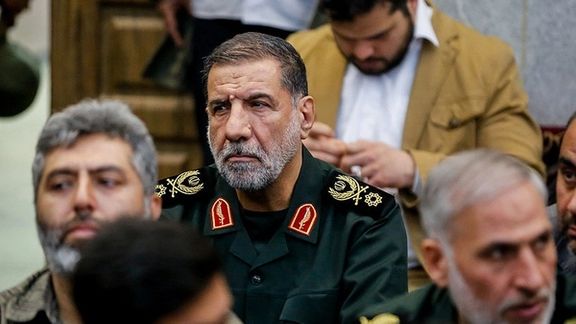
An Iranian lawmaker says the Islamic Republic intends to reduce ties with the United Kingdom and revise relations with France and Germany for their “anti-Iranian moves”.

An Iranian lawmaker says the Islamic Republic intends to reduce ties with the United Kingdom and revise relations with France and Germany for their “anti-Iranian moves”.
Esmail Kowsari said Monday, “We have always witnessed the anti-Iranian actions of European countries, Germany, France and England,” claiming that “we do not want relations with them at any cost.”
He did not explain which action of the Europeans was anti-Iranian but referring to the law approved in 2011 to reduce diplomatic and economic ties with Britain, he said “this should be pursued in the parliament, especially by the members of the National Security Commission.”
Western powers have sharply criticized Iran for its human rights violations during 3 months of protests and imposed sanctions on many officials and entities.
In November 2011, Britain imposed sanctions on the Islamic Republic for its nuclear program and the banking relations of the two countries stopped.
The Iranian parliament voted in favor of reducing ties at the diplomatic level, and two days later, a mob of Basij militia and hardliner activists attacked the UK embassy in Tehran ransacking offices and stealing documents.
However, in 2016, the diplomatic relations between London and Tehran were once again improved and Britain sent a new ambassador.
In the past three months, Tehran have linked the popular protests to a conspiracy by “foreign powers, including European countries.”
European countries reject such claims, repeatedly urging the Iranian regime to listen to the voice of the people.
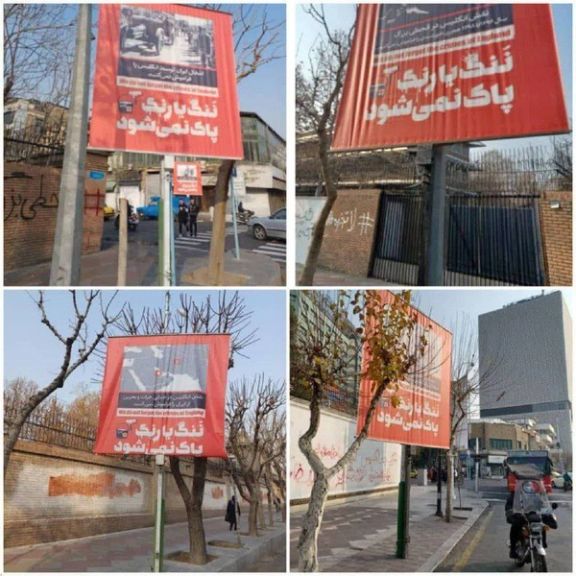
The municipality of the Iranian capital Tehran has in a move supported vandalizing the British embassy after anti-UK slogans were painted on its walls.
This comes a few days after a group of Iranian citizens voluntarily helped paint the walls of the British embassy vandalized with anti-UK slogans.
Tehran municipality, headed by a hardliner mayor, has installed banners near the embassy in the downtown bearing the sentence, “Shame cannot be erased with paint.”
The slogans had been apparently sprayed by some pro-regime elements to protest UK’s support for anti-government protesters in Iran.
Britain summoned Iran's most senior diplomat in London on December 9 to protest the hanging of Mohsen Shekari, the first protester to be executed.
British envoy to Tehran Simon Shercliff in a tweet on Thursday thanked Iranians and international friends from Germany, South Korea, France, Italy, Brazil and some other countries who sympathized with the UK.
Photos on social media show that Shercliff himself wass also helping people to paint the walls.
This was not the first time the UK embassy is vandalized by pro-regime hardliners. In 2011, the embassy was attacked by a mob of Basij militia and hardliner activists who ransacked offices and stole documents. One small building was also set on fire during the incident and several people were injured.
It came after the UK strongly supported punitive international sanctions over Iran's nuclear program and followed a vote in the Iranian parliament to downgrade ties with Britain and in effect expel the UK ambassador.
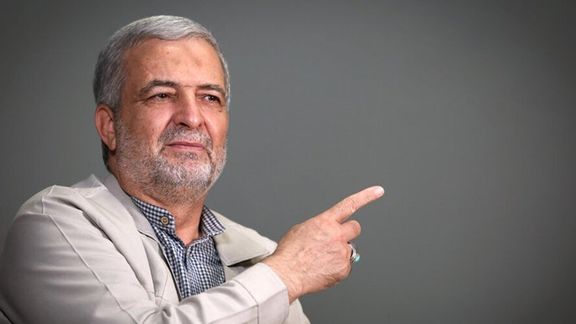
Iran has introduced its new ambassador to Kabul after the previous envoy’s comments regarding the Taliban raised eyebrows among the fundamentalist group.
Tasnim website quoted Sunday Abbas Badrifar, a counselor at the Embassy of the Islamic Republic in Kabul, as saying that Hassan Kazemi Qomi, a known IRGC Quds Force operator, has replaced Bahador Aminian as the ambassador in Afghanistan.
Badrifar claimed Aminian’s term had come to end, but earlier reports said that Aminian was expelled after the disclosure of his comments against the Taliban following the hacking of the Fars news agency by a hacktivist group.
Last month, “Black Reward” group hacked internal documents of Fars News Agency, which is affiliated with the Revolutionary Guard, and published the full text of its findings on a Telegram channel.
Part of these files was the transcript of a speech by Bahador Aminian, the then-ambassador of the Islamic regime to Kabul.
Aminian himself had noted that if his comments would be published and be heard by the Taliban, he would not be able to return to Kabul.
Aminian, in the file, had described the Taliban as “a disaster for Afghanistan, the region and the world,” claiming that Tehran has no choice but to use this opportunity “to civilize them.”
However, Iran’s embassy in Kabul denied the statements and described it as a conspiracy to create crisis in the region.
Kazemi Qomi, who has now replaced Aminian, has been working as President Ebrahim Raisi's special representative in Afghanistan since the beginning of his term.
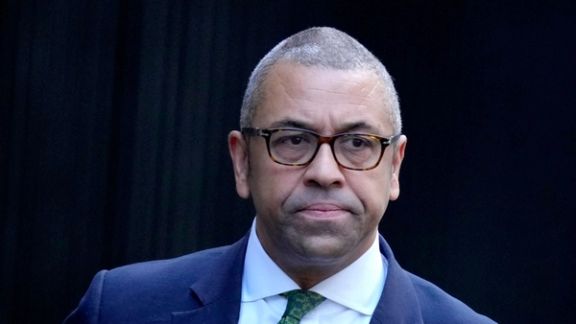
A British lawmaker, who chairs Labor Friends of Israel, has called on the UK government to expel Iran’s Chargé d’Affaires in London and to downgrade diplomatic ties with Tehran.
In a letter written to foreign secretary James Cleverly Thursday, Steve McCabe warned that current measures by the UK, US, and EU against the Islamic regime “are having little to no impact.”
Labor Friends of Israel also urged the government to take tougher action against the Islamic Republic because of the execution of two anti-government protesters.
Iran has executed Mohsen Shekari and Majidreza Rahnavard, both 23, on charges of injuring and killing security forces. They were detained during pro-democracy protests following the death of Mahsa Amini in mid-September.
McCabe slammed the execution warning that “many more” protesters are now in danger.
Further, he censured the regime’s “brutal and violent effort to suppress the legitimate protests” in which nearly 500 people – including 68 children – were killed by the security forces.
“We must now take urgent action – targeted at all those engaged in the perpetration of violence against the Iranian people – in order to both deter and punish the regime and to show our solidarity with the protesters,” he underlined.
“As usual, the regime is deploying torture and hasty trials to judicially murder those who oppose it and intimidate other protesters,” he suggested.

Iranians continue critizing both China and their own government for Beijing’s endorsement of a GCC claim over three Iranian islands in the Persian Gulf.
Politicians and pundits criticize their government for its over-reliance on China and Russia, nearly one week after the Gulf Cooperation Council met with Chinese President Xi Jinping and a joint statement was issued, which included a reference to the three islands, signaling Chinese support.
The government in Tehran in turn has voiced some mild criticism of China over the issue. It has said that the GCC statement also signed by Chinese President Xi Jinping undermines its territorial integrity. President Ebrahim Raisi has called on Beijing "to make up for the mistake," but no official response from China has been observed yet.
In a statement on Thursday, December 15, Iran's Reform Front, an umbrella organization of several reformist groups and political parties called China's stance "interventionist and opportunist."Meanwhile, the Reform Front, which is a loyal opposition to the clerical regime said that "This has been one of the worst and the most humiliating development in which Iran's tattered foreign policy has damaged the country's national authority."
The front's statement further expressed "deep regret" about what it called "Iran's foreign policy failure after Iran's involvement in the war in Ukraine based on Russian President Vladimir Putin's initiative."
The strongly worded statement was issued while reformists have been mending their badly damaged ties with the country's authoritarian ruler Ali Khamenei by not supporting anti-regime protests.
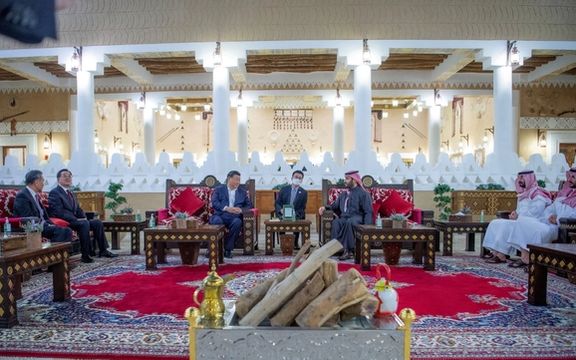
The statement added that despite its occasional support for the Iranian regime, China would never miss a chance to take advantage of Iran's internal crises to expand its trade relations with Tehran's regional rivals. It also accused Moscow of the same sort of opportunism by convincing Tehran to get involved in the Ukraine war by supplying drones to Russia.
The unprecedented criticism of Khamenei's ‘Looking East’ policy by reformists continued with an article in the reformist Etemad newspaper by Esmail Gerami-Moghaddam the deputy leader of the reformist National Trust Party. He wrote that China's stance about the three islands sent a signal to the United States that like Washington, Beijing also believes Tehran’s regional ambitions should be checked.
Gerami-Moghaddam added that China preferred trade deals with Arab countries. "This shows that Tehran's policy of supporting stronger ties with China and its Looking East policy was a serious strategic miscalculation." However, Gerami-Moghaddam stopped short of saying that the architect of that policy was no one other than Khamenei.
Meanwhile, he argued that Iran could support Taiwan's independence and said China should accept to negotiate the fate of Taiwan. Gerami-Moghaddam recalled that since 2005 the Chinese insisted in their meetings with Iranian officials that Tehran should solve its problems with its neighbors and the United States.
In an interview with reformist Sharq daily, Ali Fekri the chairman of the Iranian Organization for Investment and Economic Assistance said that China chose not to invest in Iran and to transfer its capital and investments to other Persian Gulf states. He added that attracting foreign investment is not easy because of US sanctions. He maintained that last year, Russia was the biggest investor in Iran, but did not elaborate on the matter.
Iranian political analyst Ali Bigdeli told Nameh News that China's improving relations with Arab states does not mean that US influence in the region will diminish. Particularly, the US military and security relations with Persian Gulf Arab states is far more extensive to be affected with developments such as China's extended trade presence in the region.
Despite all these justifications, criticism of the Iranian government for over-reliance on China may continue for some time. On Thursday, Moineddin Saeedi, the member of Iranian Parliament from Chabahar in Sistan and Baluchistan Province, said at parliament: "Unlimited trust in China and Russia is sheer stupidity." He also criticized the Iranian government for "not giving the right response to China."
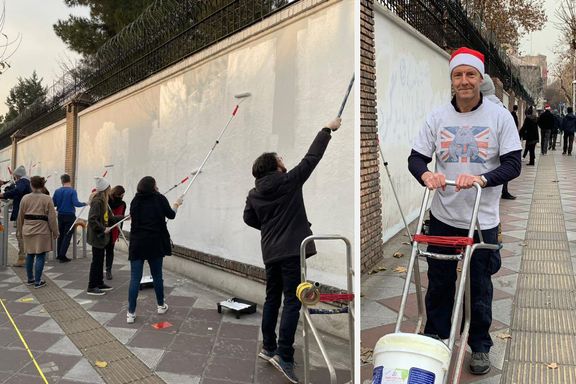
A group Iranians citizen in the capital Tehran have voluntarily helped paint the walls of the British embassy vandalized with anti-UK slogans.
The slogans had been seemingly sprayed by some pro-regime elements to protest UK’s support for anti-government protesters in Iran and condemn the violation of their rights.
Britain summoned Iran's most senior diplomat in London on December 9 to protest the hanging of Mohsen Shekari, the first such execution over ongoing antigovernment unrest.
British envoy to Tehran Simon Shercliff in a tweet on Thursday thanked Iranians and international friends from Germany, South Korea, France, Italy, Brazil and some other countries who sympathized with the UK.
Photos on social media show that Shercliff himself is also helping people to paint the walls.
This is not the first time the UK embassy is vandalized by pro-regime hardliners. In 2011, the embassy was attacked by amob of Basij militia and hardliner activists who ransacked offices and stole documents. One small building was also set on fire during the incident and several people were injured.
It came after the UK strongly supported punitive international sanctions imposed over Iran's nuclear program and in response Iranian parliament voted to downgrade ties with Britain and in effect expel the UK ambassador.